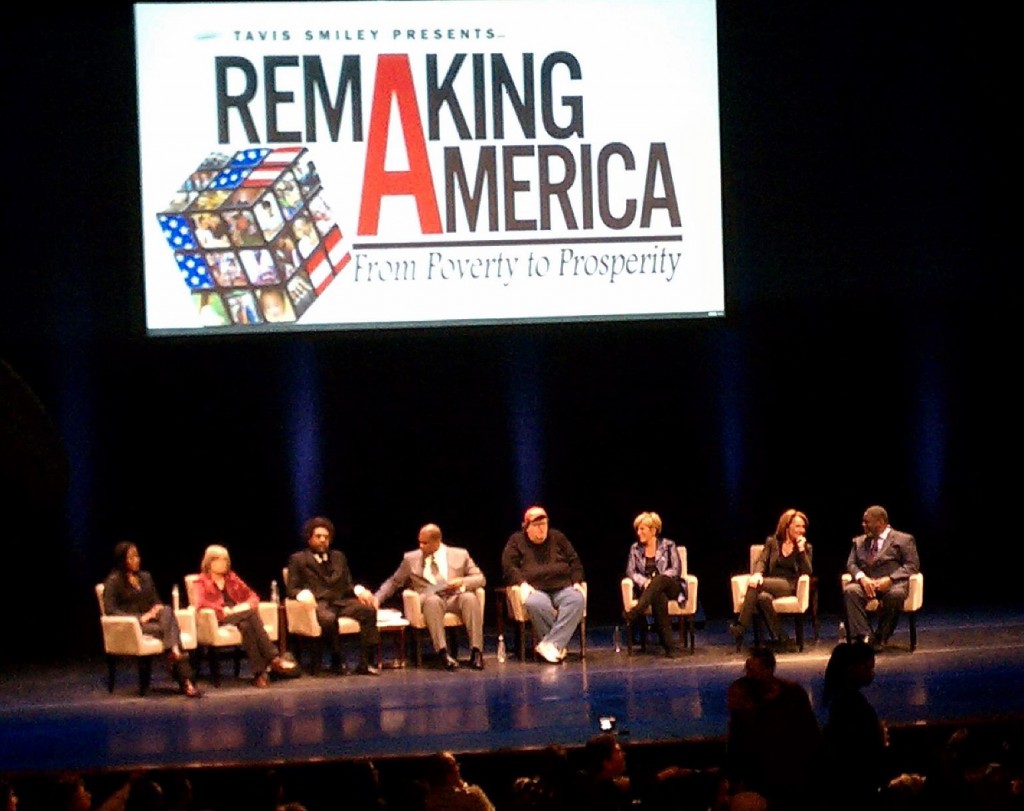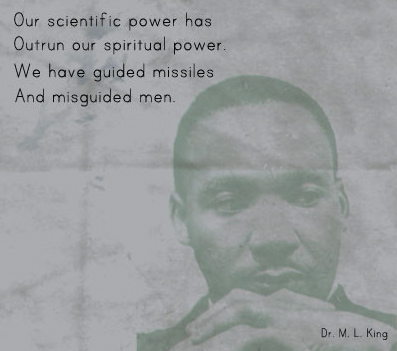150 million people in the United States are perennially poor, newly poor, or near poor. That’s right, the latest Census figures show that half of America is officially poor. In this so-called economic powerhouse of a country, 1 in 2 are struggling. According to a new survey from the Pew Research Center, conflict between rich and poor is on the rise, with Americans across the political spectrum worried about the growing class divide.
Last week I attended a live broadcast panel discussion, “Remaking America: From Poverty to Prosperity,” which ran on C-Span and will appear on PBS stations next month. (Or on YouTube if you’re willing to watch this 2+ hour unedited and grainy version.) Broadcaster Tavis Smiley hosted an eclectic, impressive group of panelists. (See photo caption.)

To me, this is a very exciting group of people. For one conservative blogger I ran across, however, the event was simply labeled, “Blame Whitey, America Sucks.” Ah, if only it were so simple. Sorry, but the socio-economic status of minority communities in the U.S. now and since its history began reflect that the “system” in its current form has not worked for many Americans and that the good ole’ days are just a delusion.
As I sat in the audience of the discussion, of course an age-old question many aid workers have probably struggled with popped into my head, “If you’re going to work on poverty in someone else’s country, shouldn’t you first make sure you’re doing something about poverty in your own back yard?” Do I, a consumer and pontificator on all things international aid and community development, think about or act on poverty enough here in America? (But I digress, last year on Martin Luther King Jr. Day, I confessed to being a recovering neocolonialist. This is a day of service, not of atonement.)
From that question, though, I began to think about how our perceptions of the poor in our own country influence how we think about the poor in the rest of the world. When I was growing up in the United States, the poor was always “someone else,” even though our farming family owned little land and hardly thrived. Nonetheless, I was taught that if you kept your head down, worked hard, and made good choices (because being poor must be a character flaw), then I could “do anything.” The epitome of the American dream is in everyone’s hands, i.e. you can be wealthy.
Needless to say, my family are no longer farmers in what is now a dying rural America. And is it needless to say, that though I have been working on and off, I have been officially unemployed for the last year and a half?
When I argue that the “expertise infusion” development aid model must be transformed, this is why. Wealthy countries most certainly have the resources and political clout to help poorer countries. However, when you look at the U.S.’s child poverty statistics or the growing paradox of hunger and obesity, what we often don’t represent is a moral or truly knowledgeable ground on which to stand.
Who are we to tell other countries, organizations, or communities how to ensure their people’s well-being, when we have not done so ourselves? And is an attitude that the poor are solely responsible for their poverty in the current that flows beneath our operating environment in international aid and philanthropy?
On this year’s day of service, I encourage us all to place ourselves in that current. Let’s think beyond what we do every day as aid workers, grantmakers, and international do-gooders. As Martin Luther King Jr. called us to action—to love, to work for justice, to have courage and integrity, to be willing to sacrifice—let us resist being ensnared in our assumptions and illusions.
As for global poverty or local poverty? Both require our indignation.
***
Related Posts
The Year Ends. The Pendulum Swings.
Accountability in all the wrong places
#111: Milestones and Mountains Left to Climb
Effective Aid: A Matter of Faith?


Why is there NO Outcry?
Even the new figures are low it is not 1.3 in 3 who are poor its 2+ in 3 people in this economic powerhouse od a country which are poor its closer to 280 out of 308 million people.
Thank you for getting some of the word out.
Nearly all of us are paid less then the cost of living. That is less than the cost of basic needs. To be making a livable wage, workers the disabled and welfare families must make 140 times the monthly rent, each week.
THE GOVERNMENT LIES
So we need us below poverty to speak out
A thoughtful comment coming in from the Peace and Collaborative Development Network & my response:
“This is interesting. Poverty is not falling from the sky neither the consequence of personal qualities. But there’s a difference between poverty in the most rich countries and poverty in the poor countries, which does not make these approachable on the same level: the first countries control more resources, have more stable democracies and they have chosen and imposed to the rest of the world a model of growth, often stealing resources from poor countries. I think that up until we are able to rediscuss how this aim, the desire of the richest countries for eternal growth and individual success within a global context of limited resources, has created poverty in rich countries and maintained poverty in poor countries … there is no solution and no meaning to action. It’s not the time to stop looking outside just because we are also becoming poor, it’s time to question the model we have used to be rich the “good old days” and find alternatives which finally guarantee dignity at global level – it’s time to be honest and recognize we need to give up some of the wants, while protecting rights. We may not be good counsellors for poor countries given the situation at home, but in any case we are still responsible, at the global level, and rich countries’ people should never hide this despite their current troubles.”
My response: “Thanks for your thoughtful response @G. Of course we must take into consideration that poverty is relative and that we in developed countries should not relinquish our responsibility in an unbalanced global economic system. I certainly do not want to suggest that now is the time to turn inward and stop offering assistance to people in the developing world. Rather, I wanted to highlight the hypocrisy of an aid industry based on an economic model that erodes the middle class in the developed world. Let’s acknowledge that “the face of poverty” is one that contains ALL faces.”
Very valuable observation the poor -always “someone else,”. Unless state ensures its people do not need to be worry for basic need/survival and are engaged to contribute for the economic activities, poverty will be decreased worldwide. For this poor is to awake to awake the state positevely for positive result.
Great post Jennifer!